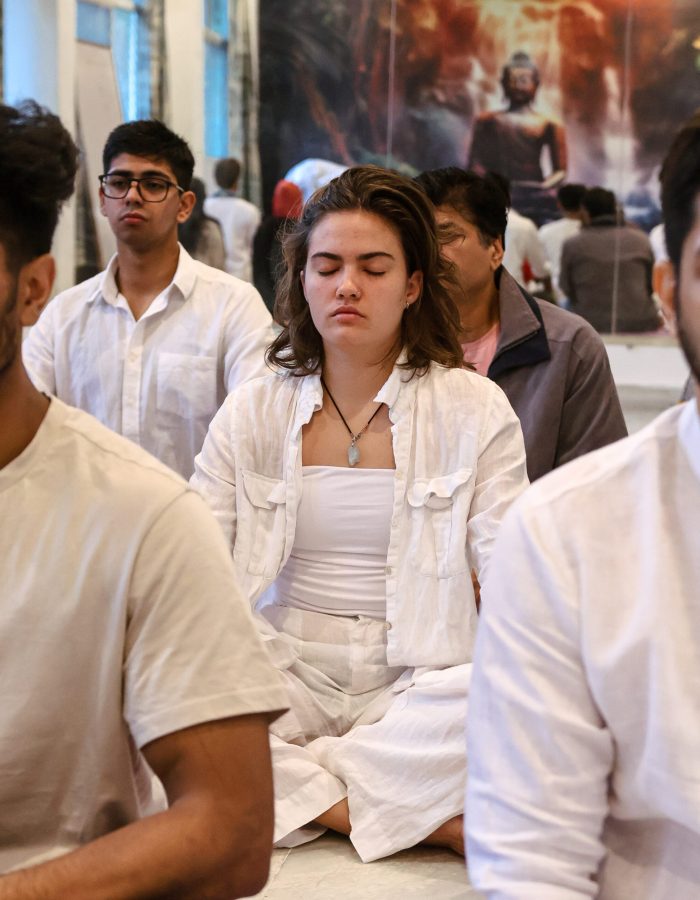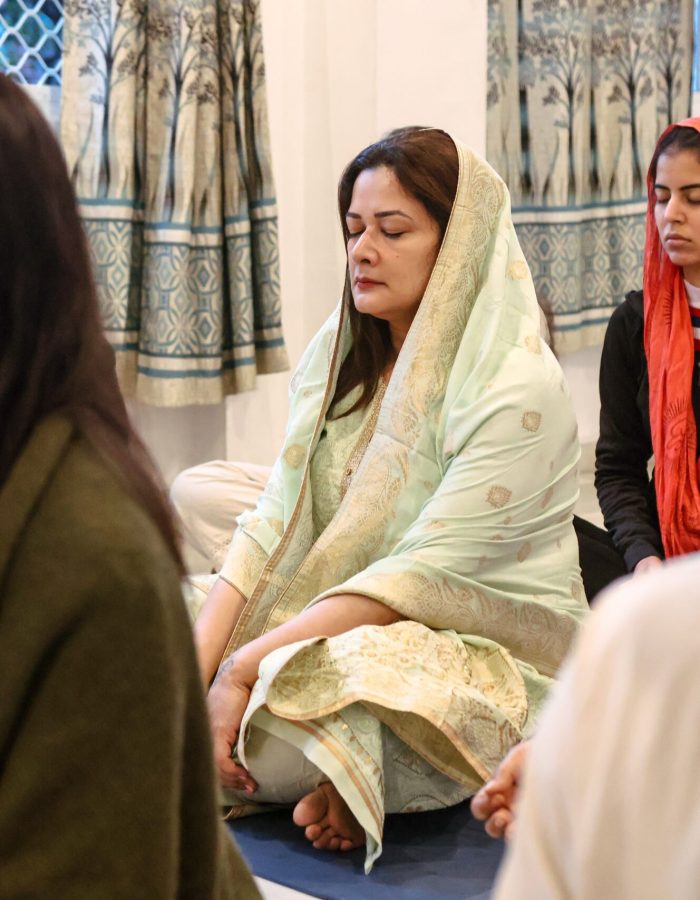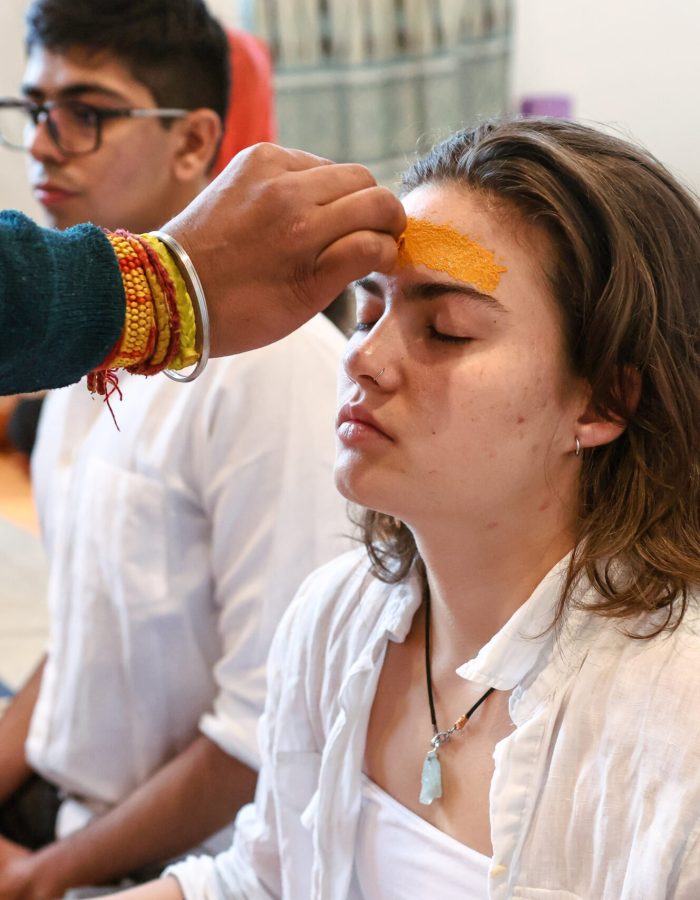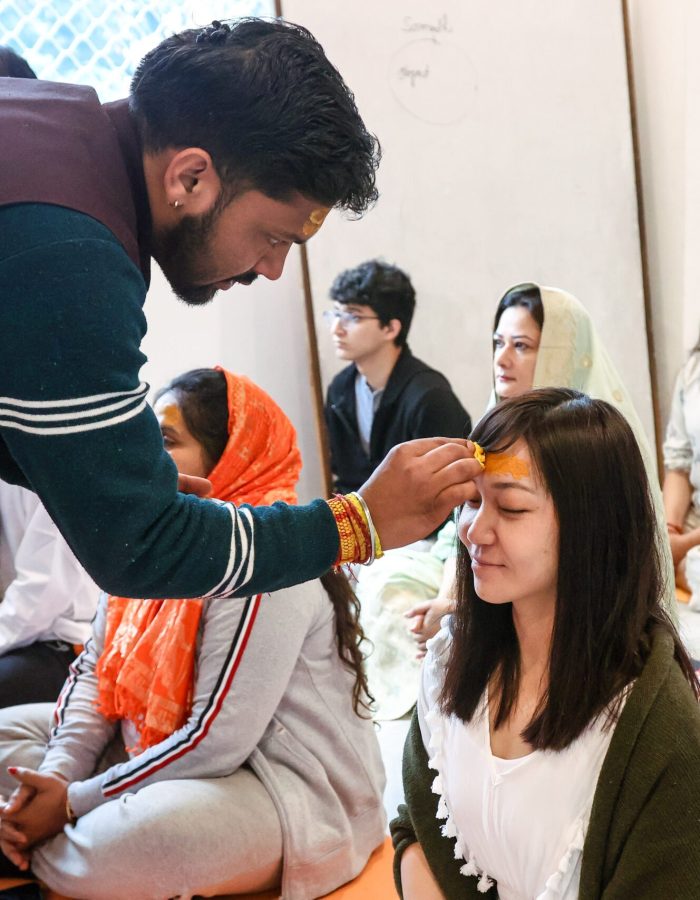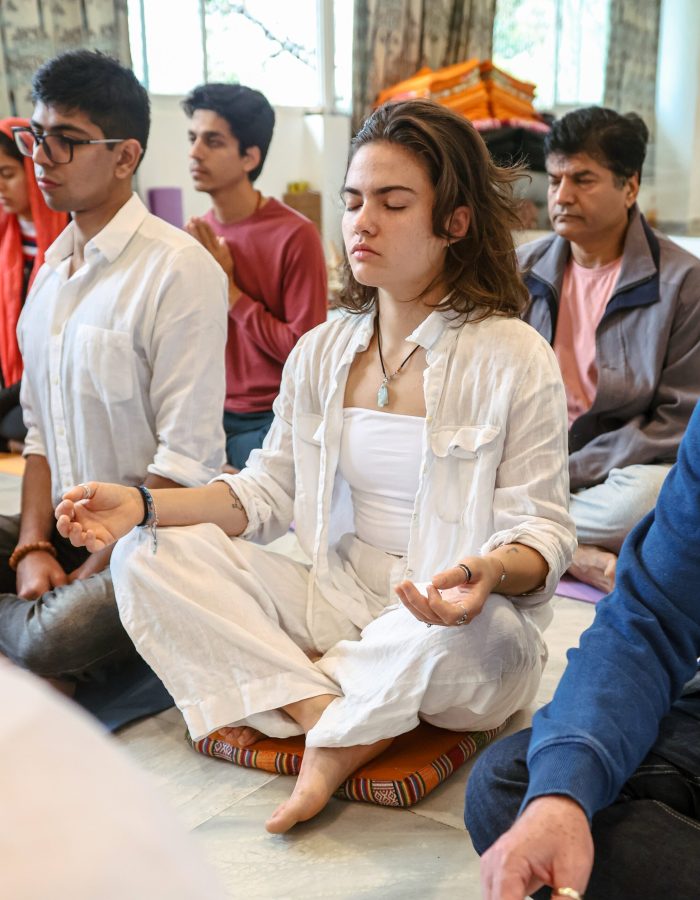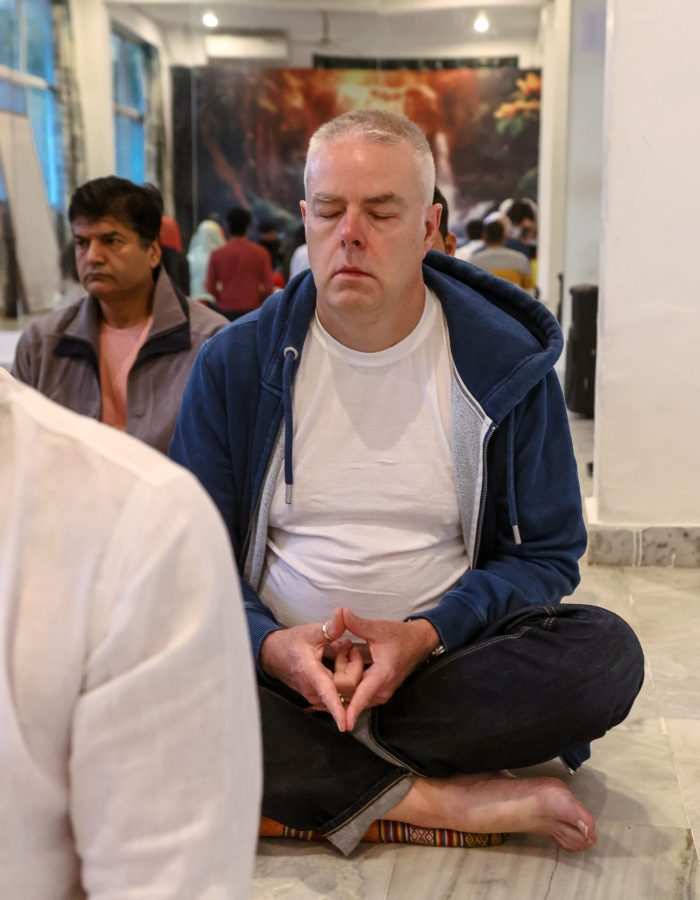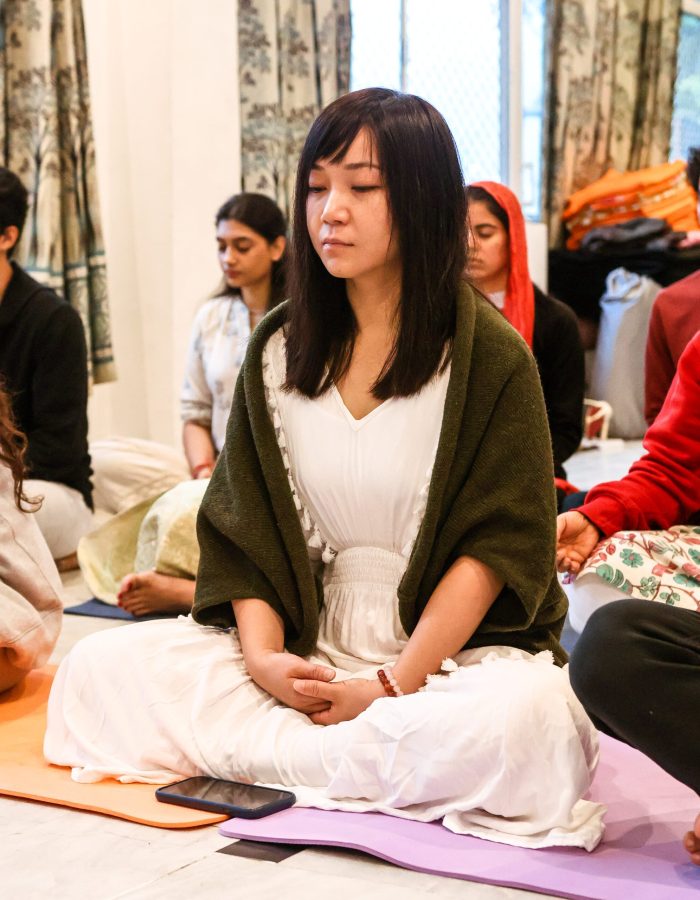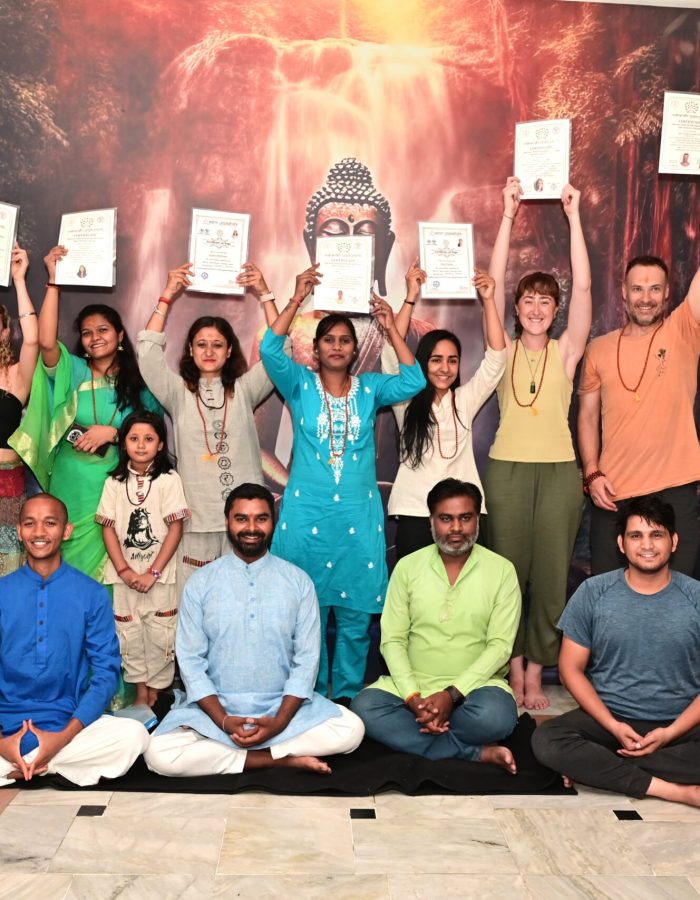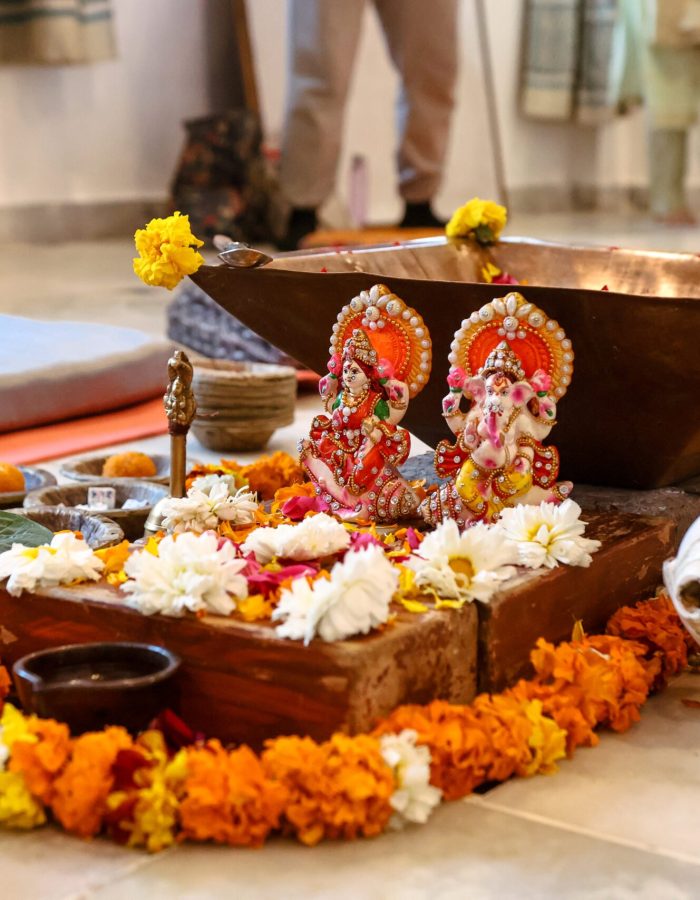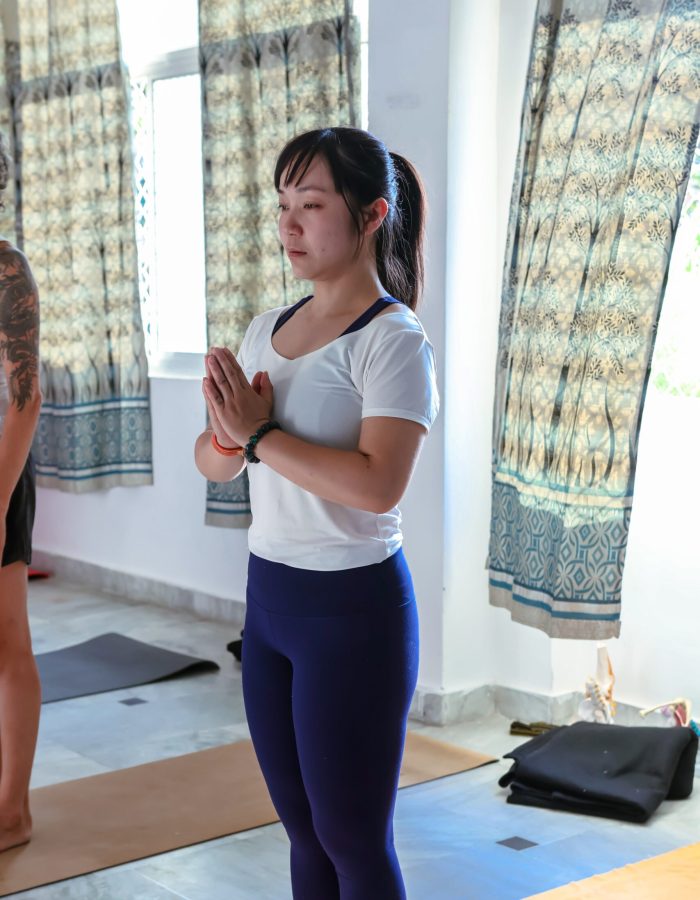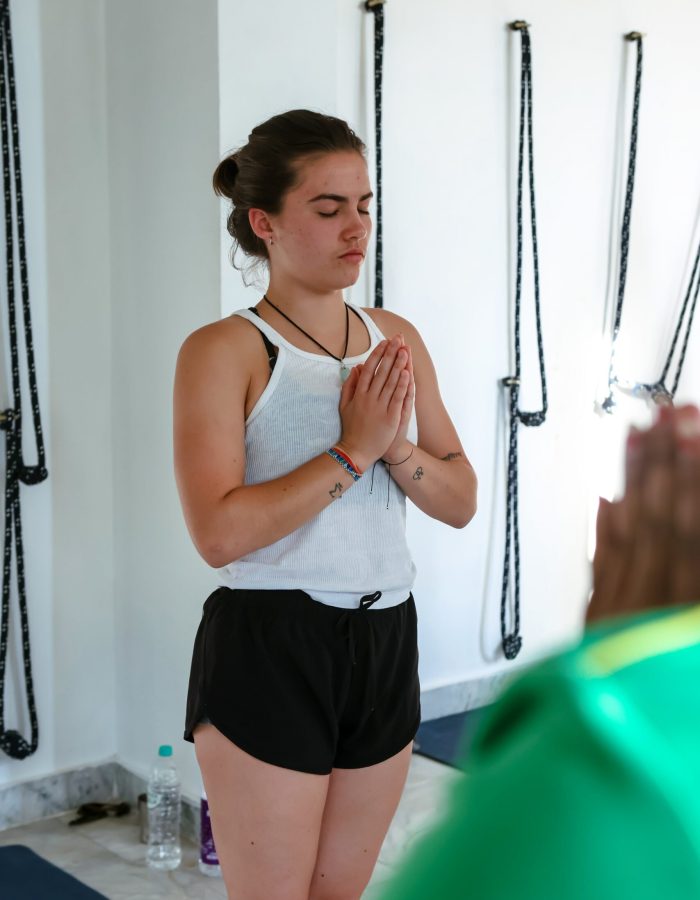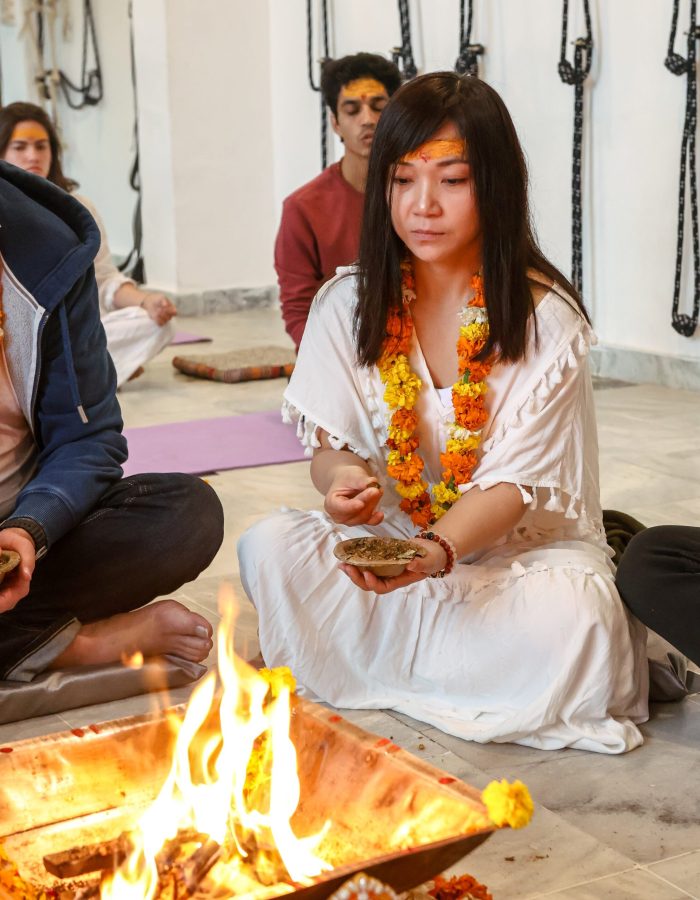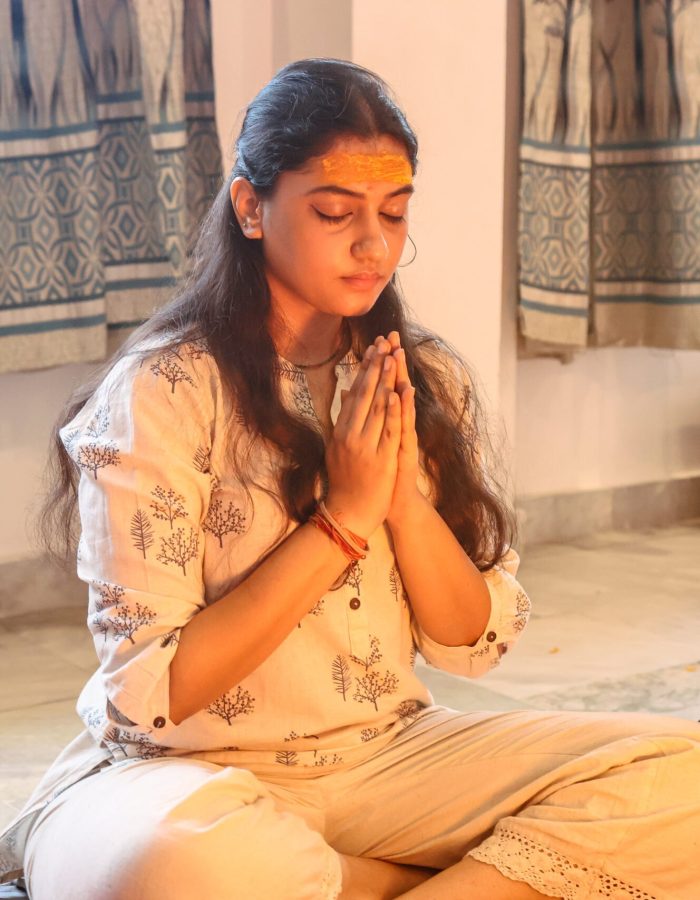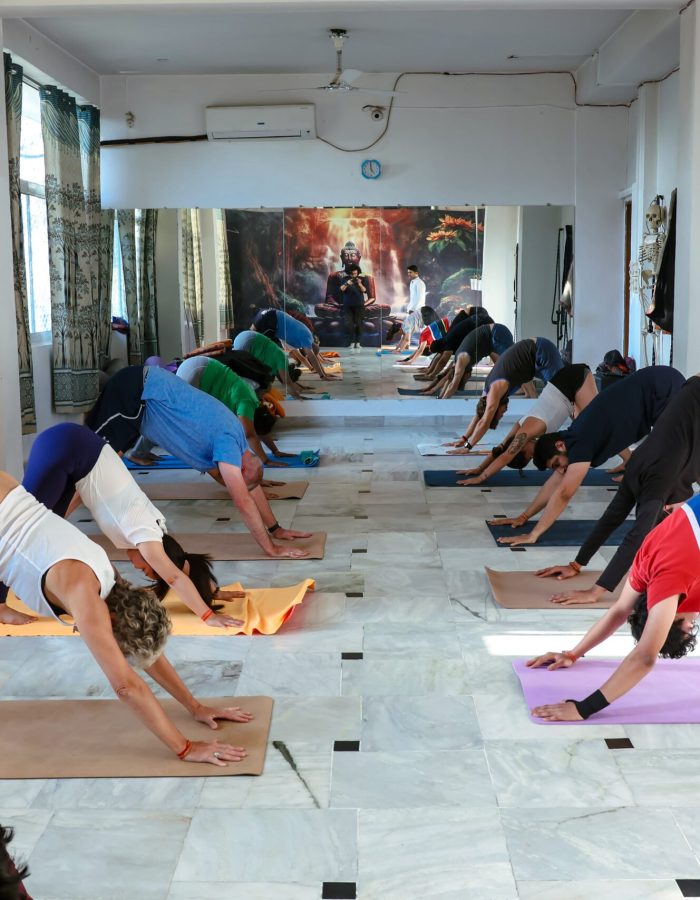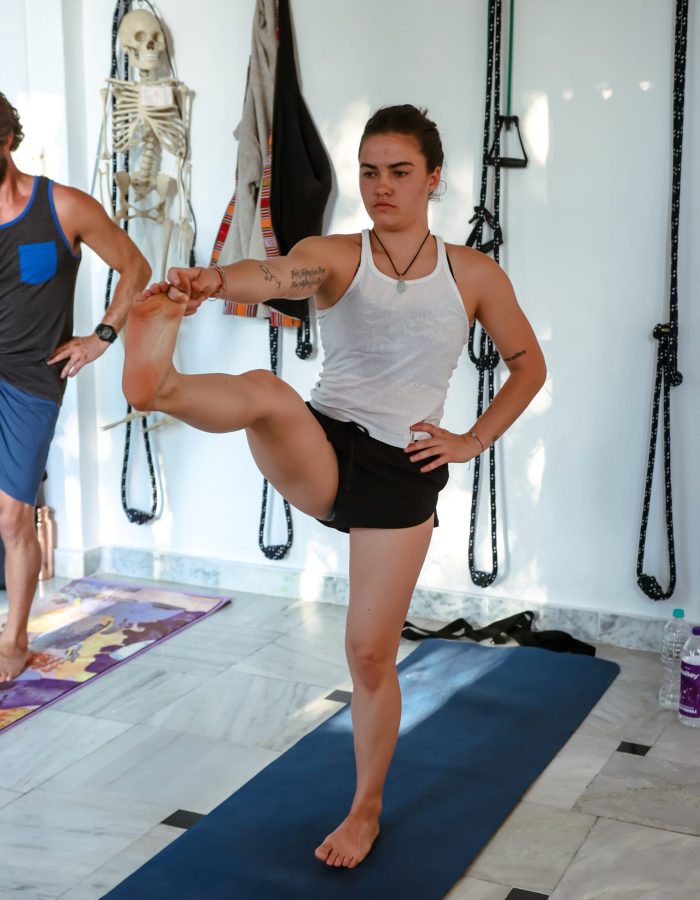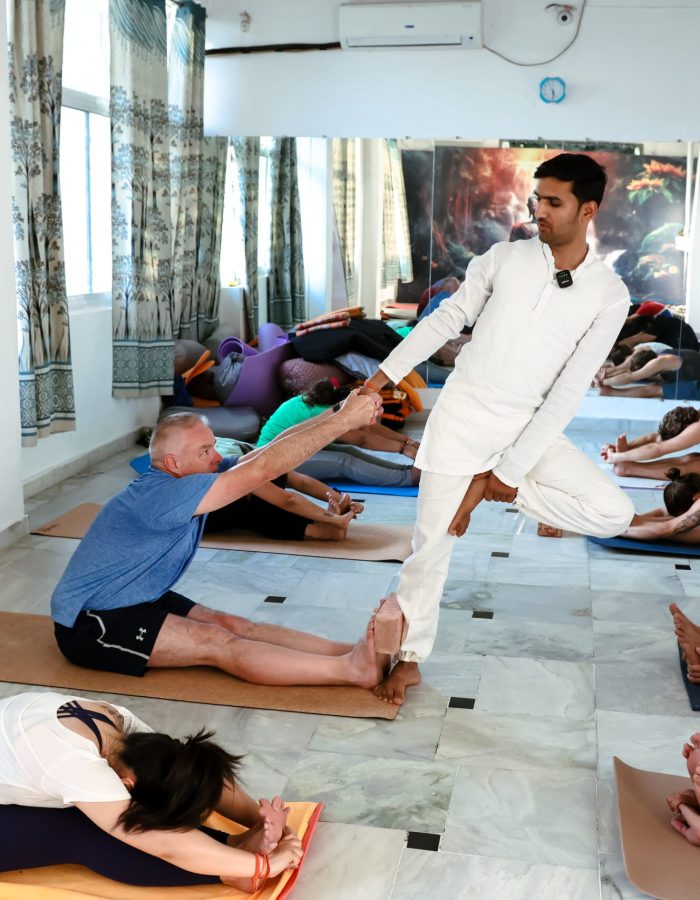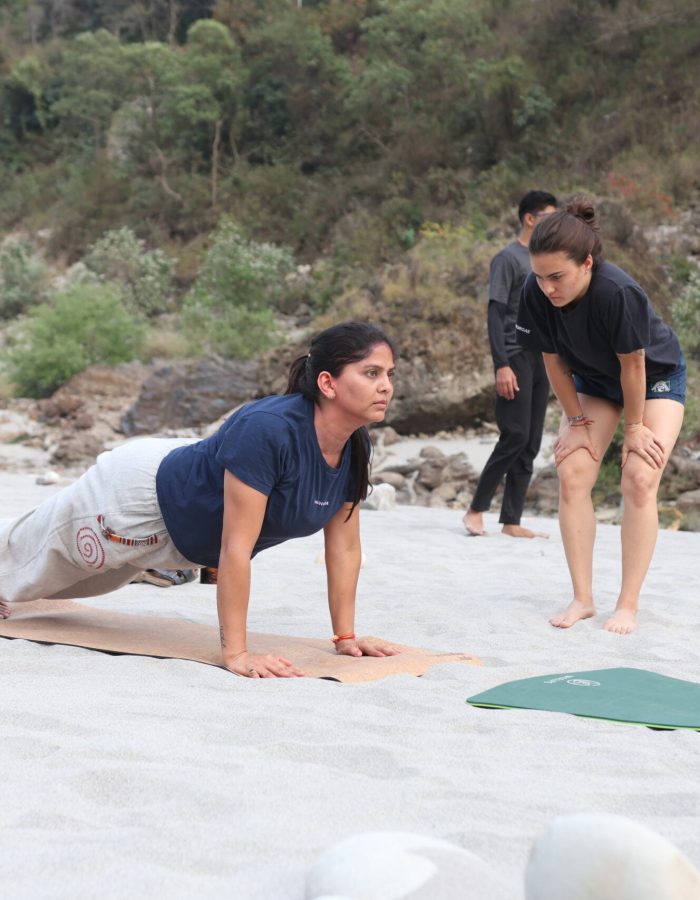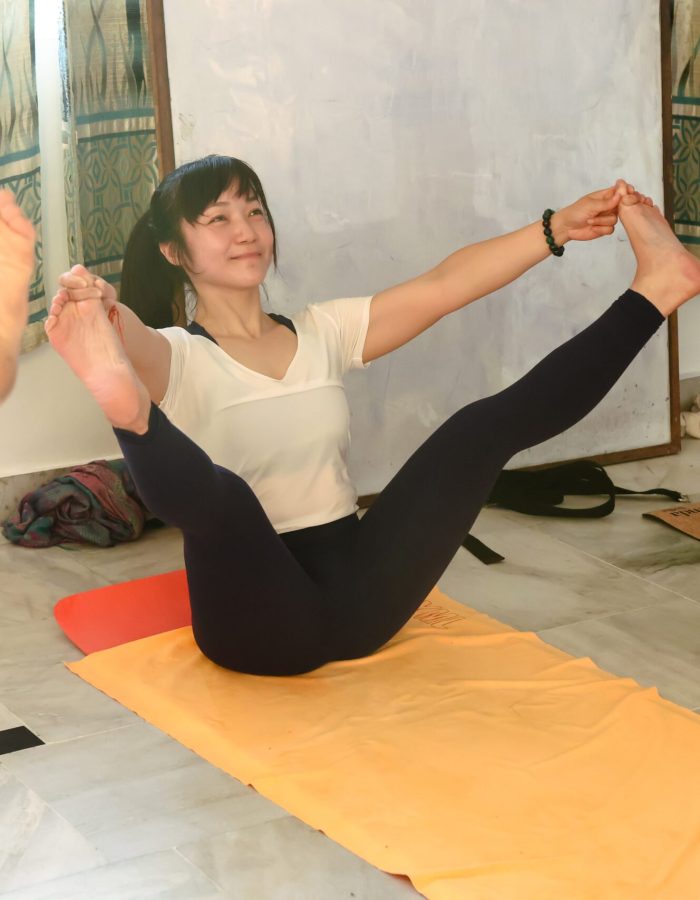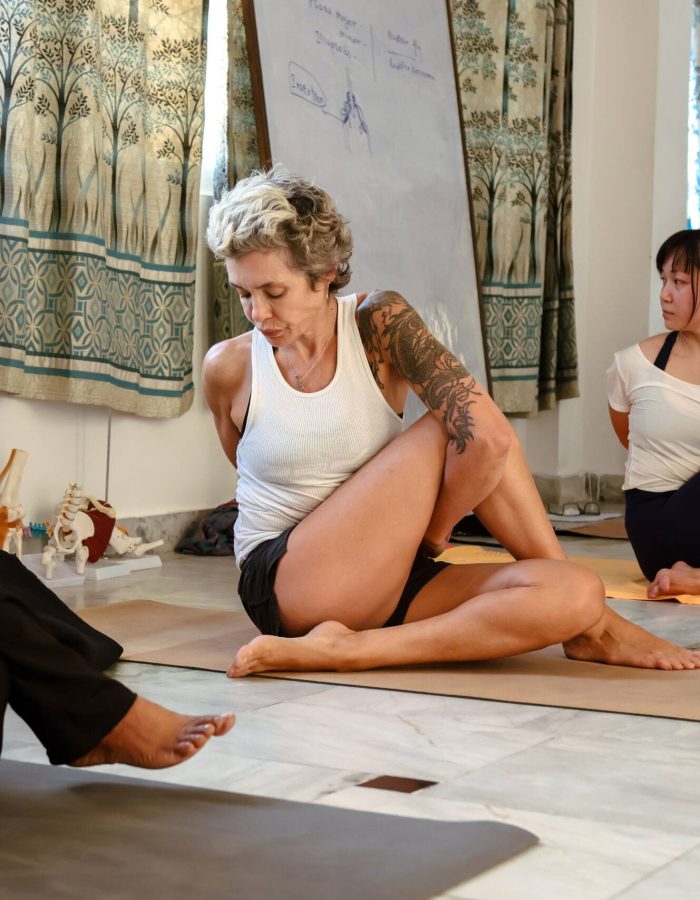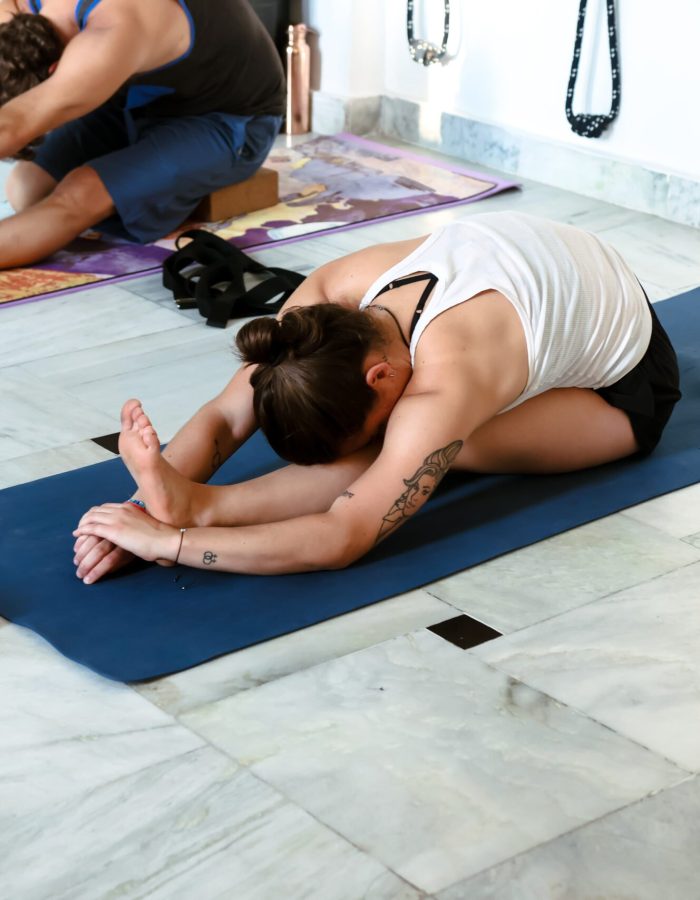FREQUENTLY ASKED QUESTION
Home – FAQS
FAQS
FREQUENTLY ASKED QUESTIONS
Yoga is a mind and body practice that involves physical postures, breathing exercises, and meditation. It promotes physical and mental well-being through relaxation, flexibility, strength, and mindfulness.
Absolutely, you do not need to be a 500-hour TTC trained expert to become an excellent yoga teacher in Rishikesh. Additionally, mastering advanced poses like headstands and Hanuman Asana is not a prerequisite for competence. Interestingly, many individuals initially enroll in yoga teacher training primarily to deepen their knowledge. Beginners often find ample time to practice and perfect their poses during the course. The 200-hour yoga TTC is an ideal starting point for those aspiring to teach. Upon completing the training, you can take up a role as an assistant yoga teacher, allowing you to gain experience and confidence.
Becoming a yoga teacher in Rishikesh is quite achievable, especially if you train at one of the renowned yoga schools certified by Yoga Alliance. This certification is highly regarded and will enhance your qualifications. After completing the yoga course, you’ll be well-prepared to teach as an intern or assistant at the same school where you completed your TTC. Once you’ve gained sufficient experience as an assistant, you can pursue independent teaching opportunities. In Rishikesh, yoga is a way of life, and teaching opportunities abound, making it an ideal place to start your yoga teaching career.
Many students ask if registering with Yoga Alliance is necessary. While it is not mandatory, it can be a valuable decision for any yoga school. Yoga Alliance, a private non-profit organization established around 1999-2000, serves as a standard for yoga education. Schools registered with Yoga Alliance adhere to specific criteria, ensuring high-quality training. Completing a Yoga Alliance course allows you to apply for the Registered Yoga Teacher certification, offering a global platform for attending courses and workshops, often at no extra cost.
Yoga Alliance provides accreditation rather than certification. Schools that receive this accreditation are known as Registered Yoga Schools. Yoga Alliance lays down guidelines that these schools must follow, including a predefined syllabus and the requirement that trained and registered teachers conduct classes. This focus on comprehensive training ensures unity and quality in yoga education.
Hatha Yoga is quite accessible and ideal for beginners. It is a static yoga style that focuses on flexibility, balance, and stability. Classes typically last between 45 and 90 minutes, which can be mentally and physically challenging. Hatha Yoga, being slower-paced, allows ample time to concentrate on breathing patterns and proper alignment, preparing you for more advanced forms of yoga.
In India, particularly Rishikesh, popular yoga styles include Hatha Yoga, Ashtanga Yoga, Vinyasa Yoga, and Kundalini Yoga. The yoga teacher training courses (TTC) cover various aspects such as yoga asanas, Pranayama, meditation, mudras, bandhas, and kriyas. Additionally, theoretical subjects like yoga anatomy, physiology, philosophy, and Patanjali’s yoga sutras are included. This comprehensive approach ensures a well-rounded education.
India, especially Rishikesh, is considered safe for travelers and is a hub for yoga tourism. Many foreigners call it home, and tourism plays a crucial role in the local economy. While it is generally safe, staying vigilant and following common safety practices, such as not venturing out alone at night, is advisable. Avoid flaunting valuables and always follow guidance from your accommodation.
The 200-hour yoga teacher training course (TTC) is an excellent starting point, especially for beginners. Hatha Yoga is recommended for those new to yoga, while more experienced practitioners might choose multi-style yoga or Ashtanga-Vinyasa flow. Accredited schools in Rishikesh, such as Rishikesh Yoga, provide expert guidance and a global perspective on yoga education.
Yes, having health insurance is essential, covering unexpected medical expenses, including COVID-19. It’s also wise to include travel benefits like trip interruption, lost luggage, and travel delays.
Yes, India’s borders have been open for international flights since November 15, 2021. Tourist visas are available for all commercial flights.
Yes, for stays under 60 days, you can apply for an e-visa online. For stays longer than 60 days, you need to apply at your nearest embassy. Note that there is no visa on arrival, so plan accordingly.
We emphasize traditional Hatha Yoga and Vinyasa flow yoga. Our comprehensive curriculum covers ethics, niyam, asana, pranayama, pratyahara, dhyana, and more.
Yes, especially in places like Rishikesh. However, it’s essential to follow the guidance of your accommodation and take standard safety precautions when traveling.
Becoming a yoga teacher in Rishikesh is quite achievable, especially if you train at one of the renowned yoga schools certified by Yoga Alliance. This certification is highly regarded and will enhance your qualifications. After completing the yoga course, you’ll be well-prepared to teach as an intern or assistant at the same school where you completed your TTC. Once you’ve gained sufficient experience as an assistant, you can pursue independent teaching opportunities. In Rishikesh, yoga is a way of life, and teaching opportunities abound, making it an ideal place to start your yoga teaching career.
Yes, we provide airport pickup services from New Delhi or Dehradun airports. Please inform us in advance if you need this service.
Bring comfortable clothing for yoga practice. We provide yoga mats and other equipment. For temple visits, attire that covers shoulders and legs is recommended.
No prior experience is necessary. Our courses are open to all levels.
Courses are taught in English, with some explanations available in Hindi.
Rishikesh experiences three main seasons:
- Summer (March to June): Temperatures can reach up to 35°C.
- Winter (October to February): January is the coldest month.
- Monsoon (July to September): Moderate rainfall with high humidity.
Rishikesh offers a variety of activities, including bungee jumping, hiking, and visiting spiritual sites.
The fee includes yoga lessons, study materials, yoga utilities, a completion certificate, and accommodation.
Transportation to and from the airport, personal expenses, flight charges, and extra school activities are not included.
- By Flight: Fly to New Delhi Indira Gandhi International Airport, then take a domestic flight to Dehradun Airport.
- By Bus: Buses to Rishikesh depart from New Delhi’s Kashmiri Gate National Bus Stand.
- By Taxi: Taxis from Delhi to Rishikesh take about 5-6 hours.
- By Train: Trains to Haridwar, which is 45 minutes from Rishikesh, take 5-8 hours from Delhi.
FEEDBACK
OUR SCHOOL REVIEWS
EXCELLENTTrustindex verifies that the original source of the review is Google. I am completed my 300 hours ytt nice location and nice looking good allPosted onTrustindex verifies that the original source of the review is Google. I choose this for my 200 hours TTC course I love to be at this place for my yoga course. All teachers were excellent, their dedication and knowledge helps us to grow each day at the course. The question before the class....like how are u all , kaise ho or all good ....made me lived each day happily Will miss all the teachers and their teachings especially hatha class, philosophy and pranayama class and meditation class. Ashtanga class was always intense so as hatha. I really like the discipline of the school, whole day routine was little tough in the starting but I sail throw. I love the satvic food,I never felt heavy after the meals It was very safe especially for girls and staff here is excellent they are always their to help you I must recommend this institute as it's challenge you give your best. Will surely miss the classes .....and place I will keep coming to upgrade my skills and knowledge. Thank you Siddharth ji .... kissan ji Thank you so much to Ganesh sir for intense hatha practice, dipender ji for entertaining and knowledge full philosophy and anatomy class Thank you pranayama sir for sharing deep knowledge abt breath Neeraj ji for ashtanga...... Rishi the 🐶 🐕 At last all staff.......I will miss you all I really had great time,will cherish forever.Posted onTrustindex verifies that the original source of the review is Google. It's really amazing and good feeling for me... before 1 month I feel very stressful depression in my life now doing this yoga practice I feel like a flow in my life I just found myself in path of Yoga....This is the journey of innersence and to devoted ourself to the supreme..... Thank you Yogpeeth to giving me such a great opportunity and Thank you to each and every teachers such a good teacher are there giving me a good leaning and teach me a path of Yoga.... Thank you Hari Om🙏🙏Posted onTrustindex verifies that the original source of the review is Google. I finished my 300-hour YTT course a month ago and i feel so grateful. I have received fundamental knowledge by very experienced teachers who helped to each individual. The Place is Beautiful- whenever you what you can dip into mother Ganga to get a free mind again. The rooms have a Beautiful view and a balcony and cozy beds- the food is 💯 veggi and 💯 yummy! The people of Maharishi Yoga Peeth are more then welcoming - they help and Support you in every Need. My Groupe was amazing- we came from all arround the Word to unit here for Yoga an amazing feeling. I got a New Yoga Family and i am more than Grateful. A spacal thanks to Sidhart-Ji to create this beautiful School with all his heart and his knowledge. To be hornest… I decided to stay a month longer at Maharishi because I don't want to leave ;) I would totally recommend this school to 💯Posted onTrustindex verifies that the original source of the review is Google. I completed my 200 hrs YTTC with MYP. I had an amazing experience - it was both challenging and rewarding. You learn so much about yourself - your strengths and areas of improvement both on and off the mat. The teachers are very knowledgeable and the classes are designed for alternation to details in proper form and practice. They keep the class sizes limited for that reason. Food and accommodations were very nice. The days are packed with early starts but a good way to learn about discipline. Highly recommend for any coursesPosted onTrustindex verifies that the original source of the review is Google. I completed my 200 hours YTT at Maharishi Yoga Peeth and it was an amazing expierience, it is challening but you won't regret giving yoursel this gift, I come back home with very usefult knowledge to share, I got to know myself more, it was very healing, this expierience definitely changed my life in a postive way. I was able to connect with beautiful souls from all over the world that became my yoga family. The staff is very kind and supportive, always aware of the students needs, facilities and food are very good and comfy. Expect a cozy and warm atmosphere, my birthday was one of the normal classes day and they took the time organize me a suprise celebration. The teachers are super high level, respectful and happy to share al their valuable knowledge; you can see from the beginning they love what they do. Siddharth Ji, the founder, shares his wisdom patiently, he leads the school with passion, compromise and devotion. This school definitely preserve the values, purpose and real essence of yoga. If you go with an open mind and allow yourself be guided by them you would you will see a beautiful susprise at the end in your body mind and soul. Thank you Maharishi family, you touched my heart.Posted onTrustindex verifies that the original source of the review is Google. I just completed the 200 hour YTTC with Maharishi Yoga Peeth, and I highly recommend training here for aspiring yogis! The classes are challenging in the best way possible, making sure you understand the correct form and alignment for various poses. The teachers are very knowledgeable, and I would say without them the experience wouldn’t have been nearly as valuable. The food was all Sattvic, which is meant for a healthy yogic lifestyle. Sattvic food can often be bland and boring, but the staff made an effort to add variety to our meals (though you should still expect a lot of rice, daal, and roti haha). I didn’t expect to grow as much as I have these past few weeks, and I believe that’s all credited to the amazing yoga instructors and pranayama + meditation teachers. I especially want to thank Sidharth ji for seeing my potential when I didn’t believe I could do certain poses, and with his guidance I’ve gained more confidence in my abilities. I’m excited to continue the discipline and consistency in my yoga practice going forward, and I’m so grateful for my time here with the valuable lessons I’ve learned. Thank you MYP team!🙏🏽Posted onTrustindex verifies that the original source of the review is Google. A highly recommended program for a philosophy of living in a loving manner. I just completed a 200 TTC and I highly recommend this school for a traditional approach to learning Yoga. More than asana, all aspects of yoga living. It is an intense course but highly rewarding. Your efforts will be doubled. I found a new family here and will return to complete another class or perhaps a 300 hour. Best school for Ashtanga vinyasa!Posted onTrustindex verifies that the original source of the review is Google. I did my 200 hour YTTC at Maharishi without much practical experience with Yoga, and I am so happy I chose Maharishi to go through this journey with. Learning yoga in this environment, in my opinion, is one of the best decisions you can take. The teachers tell us that if we put in 100% we get 200% back which couldn’t be more true. Through support, a little discipline, and a lot of love I felt like I created a family at Maharishi and learned so much about myself and my next steps in my practice. Definitely go with Maharishi if you want to be part of a genuine group of people.Posted onTrustindex verifies that the original source of the review is Google. I completed my 300hr YTT with Maharishi Yoga Peeth in January 2024 and it was an incredible experience! The teachers are so knowledgeable and I apply the wisdom they shared daily. The accommodations were lovely - these photos are of the building and the beautiful view from my bedroom. Also, the food we were served was delicious and nutritious! In addition, the practice room and space was sunny, clean, and peaceful making it an excellent space to learn. I miss some of the staff and teachers, as they were so nice to spend time with. They made such an effort to create meaningful rituals and experiences for us. I highly recommend this school for learning if you are seeking a YTT! :)Showing only 5 star reviews
GALLERY
IMAGED BY US
